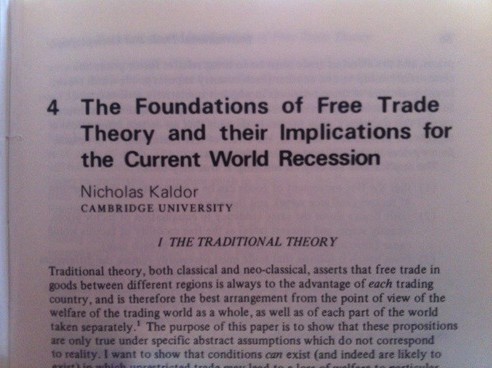There have been many critiques of Neochartalism. Almost all of them, simply ignore the most important issue which makes Neochartalism the so-called “Modern Monetary Theory”, a chimera. A delusion.
Bill Mitchell has written a post on his blog about the balance-of-payments constraint, which among other things makes fun of physical appearance of Nicholas Kaldor. In that he correctly recognizes Nicholas Kaldor as the main proponent of this idea. Mitchell rightly represents Kaldor’s views:
In fact, Kaldor thought that exports were the only true ‘exogenous’ source of income growth, given that household consumption and business investment are considered to be ‘endogenously’ driven by fluctuations in (national) income itself.
In the post, Bill Mitchell doesn’t offer any argument as to why the literature behind it is supposedly wrong. He quotes Australia’s example but doesn’t recognize that Australia’s growth rate fits Thirlwall’s law. Had Australia grown much faster, its international indebtedness would grow to a much bigger size than now, which means its growth is limited by the balance of payments constraint.
Instead, Mitchell’s main point is:
While Thirlwall adopted a Keynesian position, the ‘balance of payments constraint’ he defined has underpinned the obsession with export-led growth strategies. It is a case where the IMF and others have co-opted the ‘Keynesian’ literature to impose neo-liberal solutions on nations.
In part, this is because ‘Keynesian’ literature was flawed.
Supposedly, its the Kaldorians who succumb into policies of the IMF because of their confusions! This is quite funny, given that Nicholas Kaldor was quite opposed to free trade which imposes a huge constraint on nation’s fortunes. In fact Kaldor and his colleagues at Cambridge were advocating import controls for Britain, which is obviously not a right-wing solution and was opposed by all.
One of my favourite articles is Foundations And Implications Of Free Trade Theory by Nicholas Kaldor, written in Unemployment In Western Countries – Proceedings Of A Conference Held By The International Economics Association At Bischenberg, France.
Nicholas Kaldor on free trade
Kaldor main point in the essay is a major opposite to the doctrine of free trade. Free trade is a policy of international organizations such as the IMF. So it’s not Nicholas Kaldor and others who are being fooled by the IMF, but Neochartalists themselves who think that if nations simply float their currencies, they get rid of their external constraint.
Here’s Kaldor:
Owing to increasing returns in processing activities (in manufactures) success breeds further success and failure begets more failure. Another Swedish economist, Gunnar Myrdal called this’the principle of circular and cumulative causation’.
It is as a result of this that free trade in the field of manfactured goods led to the concentration of manufacturing production in certain areas – to a ‘polarization process’ which inhibits the growth of such activitiesin some areas and concentrates them on others.
So as you see, there is an opposition to the “consensus” view. But according to Neochartalists, there is no problem with free trade: just expand domestic demand by fiscal policy. Imports are benefits, exports are costs according to them!
The main point of the post is that it is Neochartalists whose views are orthodox, not other Post-Keynesians following the work of Nicholas Kaldor. It’s funny of them to assert the other way. Look at it this way: opposition to free trade requires import controls, tariffs and things such as that. Is that the mainstream view – to put tariffs? However it is funny if you see a Neochartalist arguing against free trade as it would mean an inconsistency. If fiscal policy alone can bring full employment, why oppose free trade?
